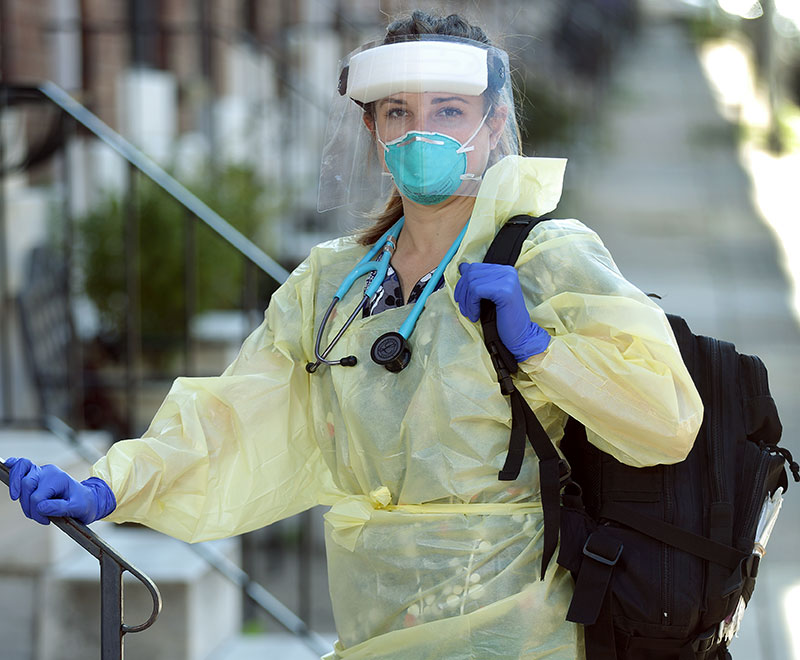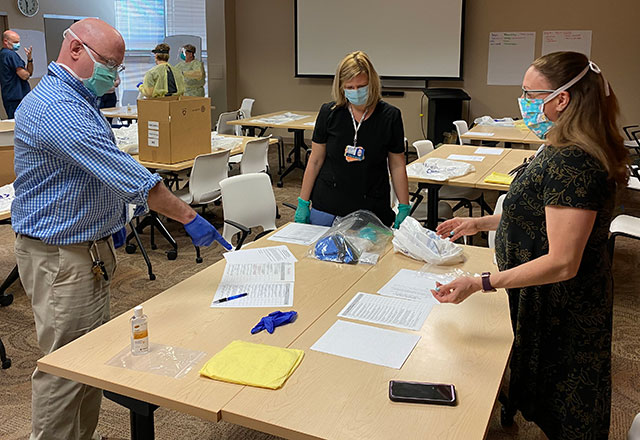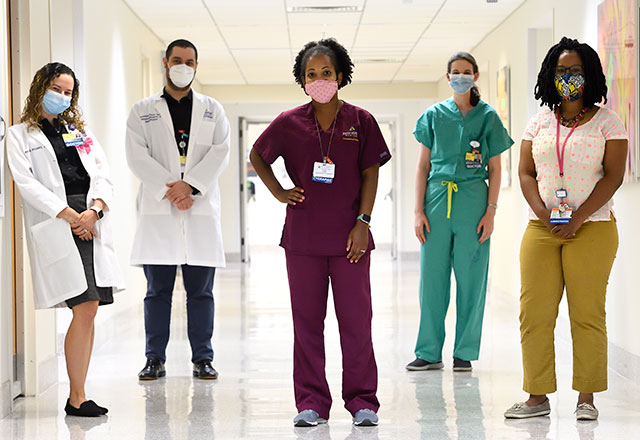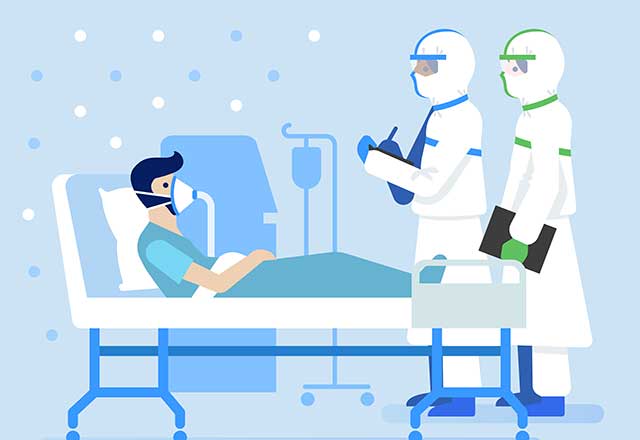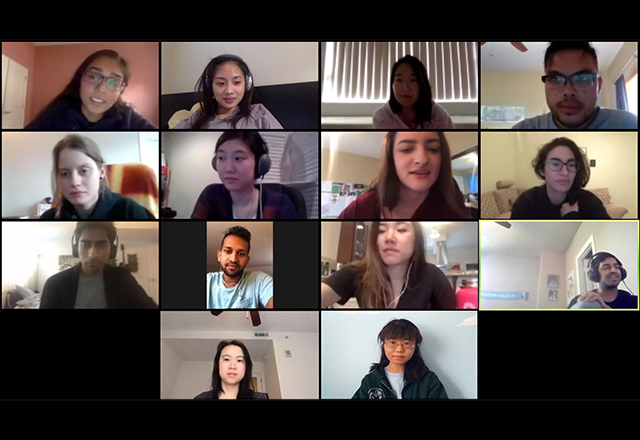The Johns Hopkins Post-Acute and COVID-19 Team (JH PACT) Program is a collaboration between the Division of Pulmonary & Critical Care Medicine and the Department of Physical Medicine and Rehabilitation. Our goal is to provide interdisciplinary, standardized care to address the unique needs of COVID-19 survivors and survivors of critical illness.
JH PACT consists of two core service lines that work in tandem to provide comprehensive care. As needed, our physicians may refer patients to other specialists to support recovery.
Our Services
Physician Services

Therapy Services
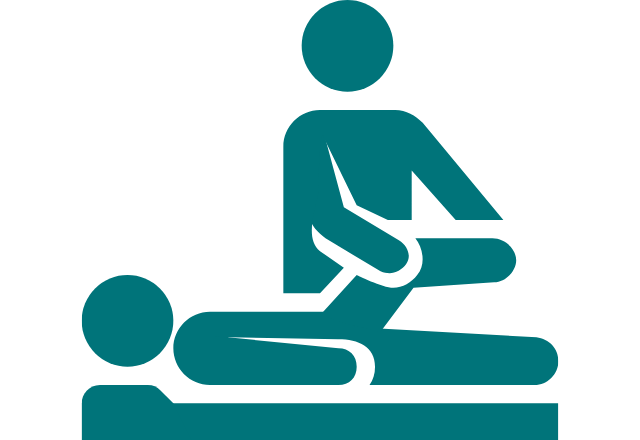
How to Enroll
Interested patients must have their primary or specialty provider complete and sign our enrollment form. Depending on a patient's insurance provider, a Maryland uniformed consultation referral form may also be required.
Completed forms and outside records can be:
Fax: 410-367-2725
Email: PACT@jhmi.edu
Long COVID
In some people who recover from COVID-19, lingering health problems that can last for months. Hear from PACT team members and two "long hauler" patients as they describe their experience.
Resources for COVID-19 Survivors
Provider referrals are required for JH PACT clinic appointments. Learn more about referral criteria.
- Johns Hopkins Outcomes After Critical Illness and Surgery (OACIS) research group: This site contains information and videos for patients, families, clinicians and researchers looking to learn more about recovering from a critical illness such as COVID-19.
- Education on post-intensive care syndrome: This handout from the American Thoracic Society provides an overview of (PICS).
- Pediatric Post-COVID-19 Rehabilitation Clinic: A clinic at Kennedy Krieger Institute for children and adolescents who have recovered from COVID-19 but need additional support to regain lost neurological and physical functioning as a result of the illness.
- Caring for Patients with COVID-19 and Post-Intensive Care Syndrome: This article lists some of the effects of severe COVID-19 and explains how we treat these symptoms at Johns Hopkins.
- Centro SOL: Spanish language resources for COVID-19 survivors. Centro SOL also hosts a weekly virtual support group.
JH PACT Research Studies
-
Summary: The goal of the COVID Patient Registry is to collect data on individuals who were diagnosed with COVID-19 and who are seen for follow up care at Johns Hopkins. We hope to understand the natural history of the illness and ultimately improve the care and survival of those who were treated for COVID-19 to improve understanding, treatment and survival.
P.I.: Ann Parker, M.D., Ph.D. Contact: PACT@jhmi.edu
-
Summary: People with solid organ transplants are at high risk of developing COVID-19, but the long-term neurocognitive aspects of COVID-19 infection (such as anosmia, loss of taste, loss of hearing, headaches, mental “fogginess,” confusion and fatigue) in this population is still not fully understood.
This study aims to: 1) Estimate the prevalence of mental, cognitive and physical impairments in solid organ transplant patients hospitalized with COVID-19 in the short-term and long-term period; and 2) understand changes in mental, cognitive and physical impairment in solid organ transplant patients hospitalized with COVID-19 in the long-term.
P.I.: Sami Alasfar, M.B.B.S., M.D. Contact: salasfa1@jhu.edu
-
-
Summary: No studies of post-acute COVID-19 symptoms and sequelae have focused specifically on people living with HIV (PWH). Given elevated baseline levels of inflammation and T-cell activation in this population, we hypothesize that PWH are more likely to experience persistent symptoms after acute COVID-19 than HIV negative people.
This is part of a national study conducted remotely with telephone and online surveys and blood samples collected via a mobile phlebotomy company at the participant’s home. Specifically, this study aims to: 1) formally and prospectively characterize symptoms and sequelae of post-acute COVID-19 in PWH as compared to HIV-negative COVID-19 survivors and PWH and HIV-negative people with no history of COVID-19; and 2) identify blood-based biomarkers or immune signature(s) that associate with prolonged or persistent post-acute COVID-19 symptoms in PWH in comparison with the general population.
P.I.: Annie Antar, M.D., Ph.D. Contact: aantar1@jhmi.edu
JH PACT in the News
- It's not just brain fog: Vertigo, hair loss, and lagging sex drive are also long COVID symptoms
- ‘A wake up call’: experts release new guidance on cardiovascular symptoms of long COVID
- How Long COVID Could Change the Way We Think About Disability
- For Patients with Long COVID, Chronic Fatigue Syndrome May Offer a Guiding Star
- In It For The Long Haul
- How Long-haul COVID Is Affecting Families Mentally and Emotionally
- EXPLAINER: What You Should Know About "Long Haul" COVID-19
- As the Pandemic in the US Slows, the Fight Against 'Long Haul' COVID Is On
- COVID Long-haulers: What We Know About the Debilitating Symptoms that Last for Months
- 'Long COVID' Impacting Patients Who Never Tested Positive for the Coronavirus
- Some COVID-19 Long Haulers Have Had Symptoms Since the First Wave. Can They Still Get Better?
- Maryland Man Battling 'Long COVID' for 11 Months
- ‘Dynasty’ Reunites To Fight Against Long COVID
- COVID-19 'Long-Haulers' Spark Area Health Care Movement to Create New Coronavirus Recovery Programs, Clinics
- Most Common COVID-19 Symptoms That Won't Go Away
- Who’s most at risk of developing long COVID? Experts think these 6 groups of people might be
- Physician Group Releases Guidance on Cardiovascular Issues in Long COVID
- The Long Haul
- COVID-19 Spreads As People Pass It Along to Someone They Live With
- Johns Hopkins Medicine Is Trying to Help COVID-19 Patients with Long-Term Symptoms
- Will Some COVID-19 Survivors Require a Lung Transplant to Fully Recover?
- Doctors: Most COVID-19 Patients Recover at Home
- Coronavirus Latest: Johns Hopkins Creates Team to Help COVID-19 Patients Deal with Psychological Effects of Virus
- Epic-Integrated Telehealth at Johns Hopkins Boosts Quality and Safety During Pandemic
- Johns Hopkins Doctor Talks Creative Approach Used to Assist Patients in COVID-19 Recovery
- Patients Treated for COVID-19 Now Coping with ‘Long COVID’
- As COVID-19 Cases Surpass Records, Cautions Against Holiday Gatherings
- Podcast: In It for the Long-Haulers—Investigating Long COVID

